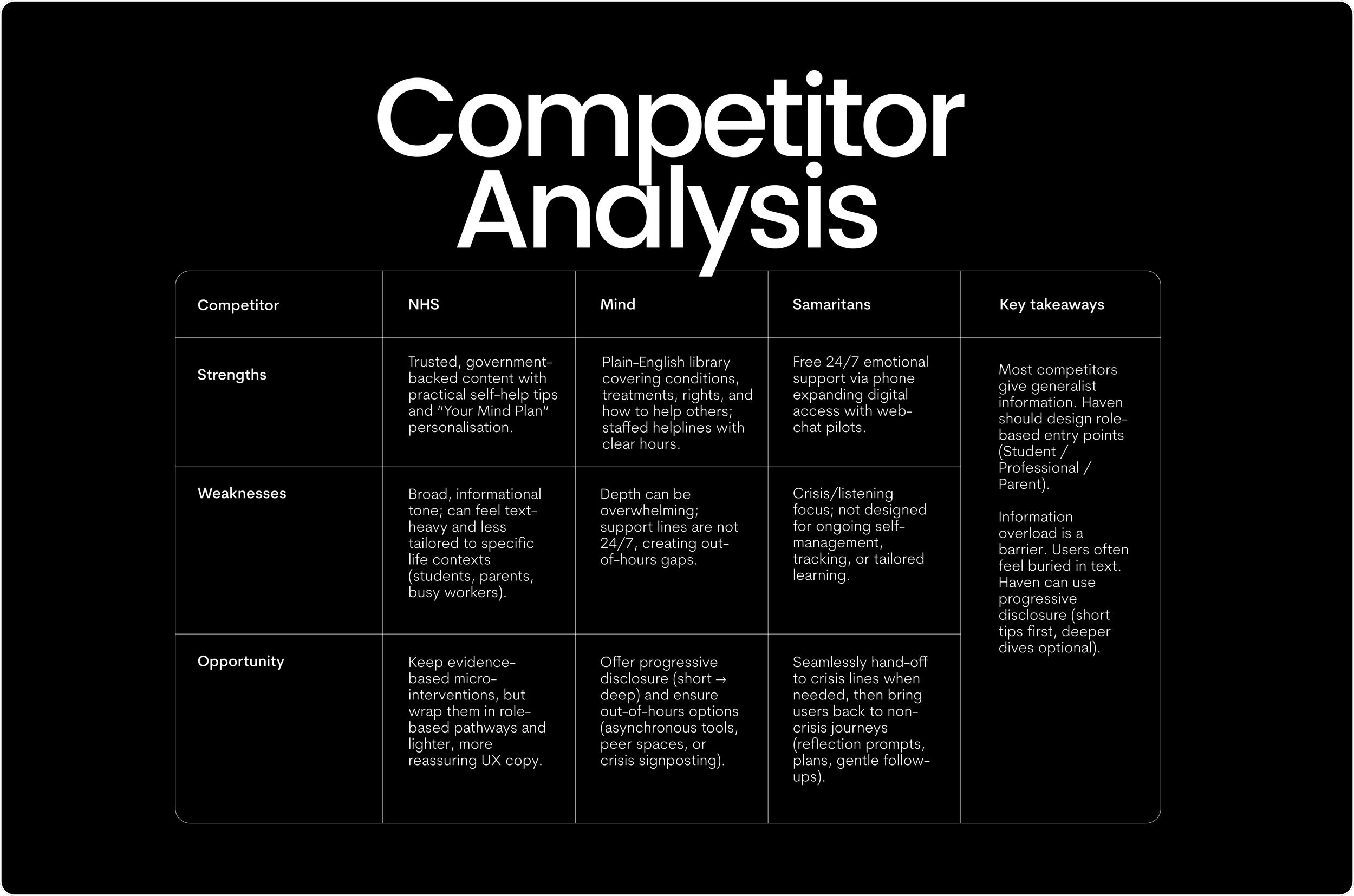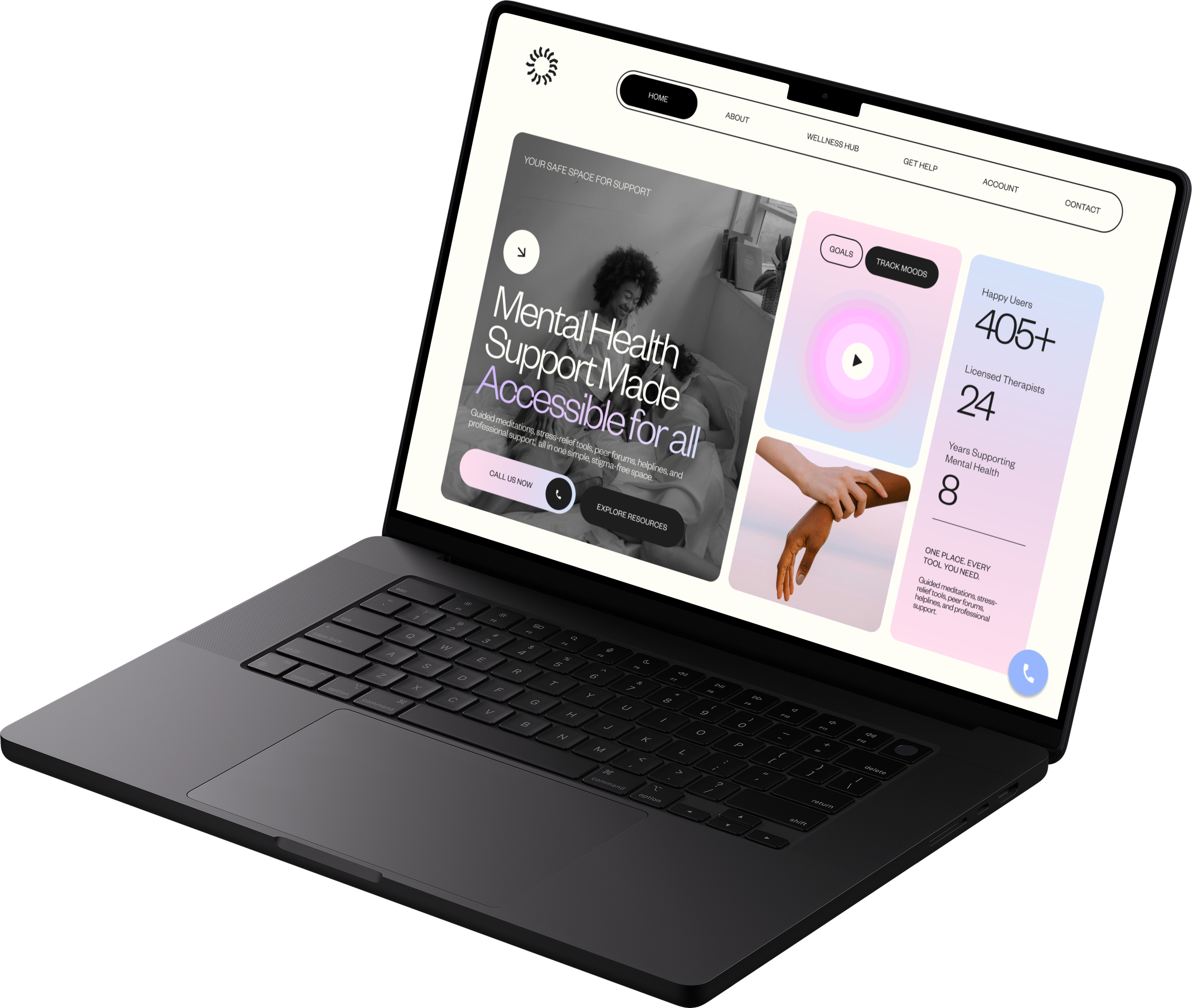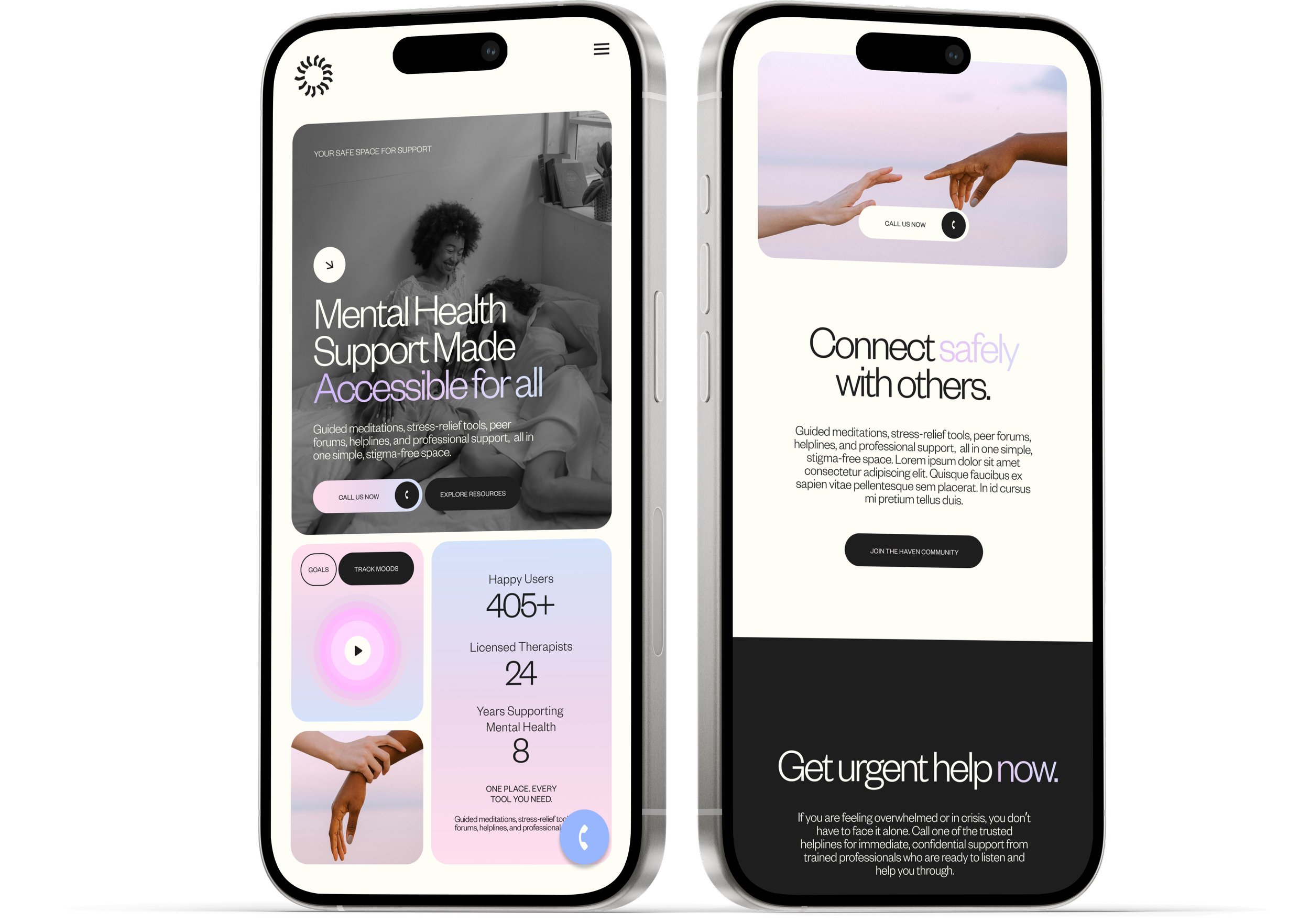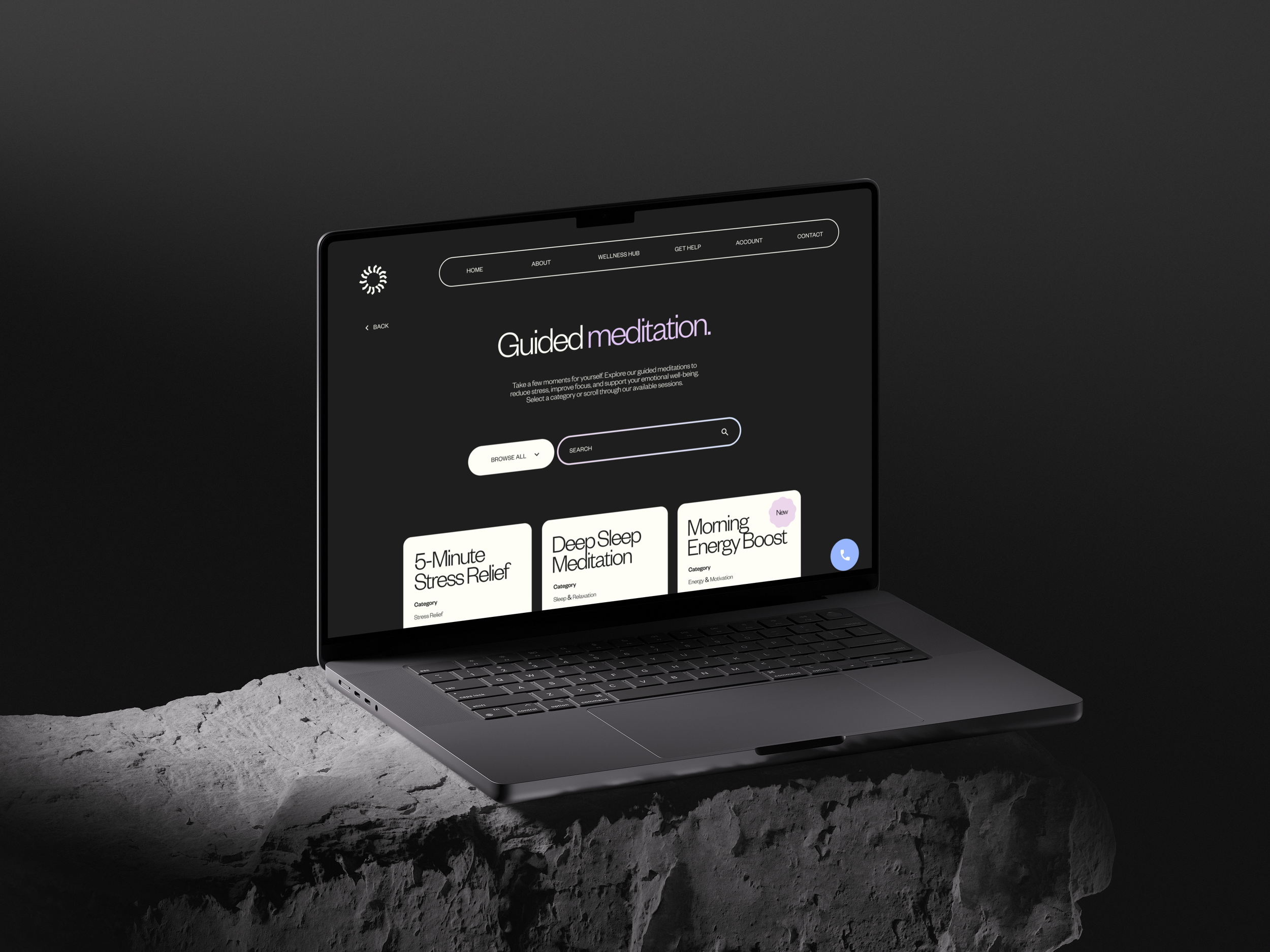Haven
Project / Haven
Role / Lead UX Designer
Date / July 2025
Mental health support made accessible to all
Haven
(1) What is Haven?
Haven is a mental health support hub that provides accessible resources, self-care tools, and a safe space for individuals seeking guidance.
The typical user is between 18–55 years old, ranging from university students to early career professionals, though the platform is designed to support users of all ages. Haven’s goal is to make finding help, learning coping strategies, and connecting with support simple, approachable, and stigma-free.
(2) The Problem
Many existing mental health websites overwhelm users with cluttered layouts, medical jargon, and rigid designs that feel unwelcoming.
Navigation is often unclear, with resources scattered across different sections, making it difficult for individuals to quickly find relevant help. This lack of clarity and accessibility can erode trust, leaving users feeling unsupported, discouraged, or hesitant to return. In addition, many platforms fail to create a sense of safety or empathy, which is crucial for individuals seeking mental health support. As a result, users may abandon these sites in moments when they most need guidance.
(3) The Goal
Haven aims to provide a safe, approachable, and stigma-free digital environment where users feel understood and supported.
The platform will prioritise clear navigation, ensuring resources such as self-care tools, articles, and professional guidance are easy to find and access. By adopting warm, inclusive design principles and approachable language, Haven will encourage trust and reduce the sense of isolation often experienced when seeking help. The goal is not only to provide resources but also to foster ongoing engagement, enabling users to build healthy routines, track their progress, and return to the platform as a reliable source of support.
Understanding the user
(4) User Surveys
I conducted a series of user interviews and surveys to gain deeper insight into how people currently access mental health resources, what challenges they face, and what they feel is missing.
Participants included students, professionals, and parents aged between 18 and 55, who were seeking support for stress, anxiety, or general wellbeing.
The research revealed that many users find existing resources fragmented, overly clinical, or difficult to navigate. Some felt overwhelmed by jargon, while others were discouraged by long waiting times and unclear guidance. Instead of offering reassurance, many platforms left users feeling isolated or unsure of where to turn.
Through empathy mapping and thematic analysis, I identified a strong need for a simpler, more compassionate solution,one that not only provides access to reliable mental health information and services, but also creates a sense of support, clarity, and connection. These insights formed the foundation for Haven’s design, ensuring the platform would meet real user needs in an accessible and encouraging way.
(5) Pain Points
User research highlighted several challenges with existing mental health platforms that often prevent people from accessing the support they need in a timely and reassuring way.
Overall, the findings revealed that current platforms can leave users feeling more isolated, rather than supported, creating a need for a simpler and more compassionate alternative.
Complexity
Many platforms are overloaded with information and technical language, making them intimidating and difficult to navigate.
Accessibility
Users often struggle to find free or affordable resources, with long waiting times and eligibility restrictions creating further barriers.
Stigma
Some platforms feel too clinical or formal, which can discourage users from seeking help openly.
(6) User personas
To better understand the needs, frustrations, and goals of Haven’s target audience, I created three user personas based on insights from interviews and surveys.
These personas represent the core user groups most likely to benefit from the platform: young adults seeking accessible mental health resources, working professionals managing stress and burnout, and parents looking for supportive guidance to balance family and personal wellbeing. Each persona highlights different priorities, from finding affordable and reliable help, to seeking tools that promote balance, to reducing feelings of isolation.
By grounding the design in these personas, Haven was shaped to reflect real user challenges and ensure the platform offers accessible, compassionate, and practical support across a variety of lifestyles and needs.



(7) User Journey
To explore how different users might interact with Haven, I created journey maps for each of the three core personas: young adults, working professionals, and parents.
These maps illustrate their goals, feelings, touchpoints, and challenges at each stage of using existing mental health support platforms. By mapping these journeys, I was able to identify opportunities to design a smoother, more supportive experience that addresses real frustrations while building trust and engagement.



(8) Competitor analysis
An analysis of three major UK mental health services, NHS Every Mind Matters, Mind, and Samaritans, highlighted both strengths and limitations.
NHS Every Mind Matters offers evidence-based, government-backed guidance but can feel overly text-heavy and generalist. Mind provides an extensive library of plain-English information and helplines, though its depth can overwhelm users and its support is restricted to office hours. Samaritans delivers invaluable 24/7 crisis listening, but it is designed for immediate support rather than ongoing wellbeing. Together, these findings reveal a gap for Haven to occupy: providing accessible, personalised and always-available resources that bridge the space between crisis response and everyday mental health maintenance.
(10) Information architecture
The information architecture for Haven has been designed to provide clarity, accessibility, and a sense of safety for users seeking mental health support.
The architecture balances structured information with interactive tools, ensuring users can access trusted resources while also engaging in ongoing self-care and community support.
Design process
(11) Usability study findings
Based on feedback from the usability study, several design improvements were made to better support user needs.
Navigation Simplification
Replace the separate “Resources” and “Self-Care Tools” sections with a single “Wellness Hub” dropdown that combines guides, self-care tools, and community features. This condenses the navigation and reduces confusion.
Motivation & Feedback
Add clearer confirmation messages after mood logging, along with a streak tracker or progress badge, to motivate users and reinforce positive engagement.
Safety & Clarity
Improve button labelling (e.g., “Join Peer Group” instead of “Start a Discussion”) and provide a short explanation of what to expect before entering peer groups. Introduce a prominent “Are you in danger?” button linking directly to emergency services for urgent support.
Refining the Design
(12) Accessibility
Accessibility was a central focus throughout the design of Haven. Clear typography, strong colour contrast, and simple navigation were prioritised to ensure that all users, including those with visual or cognitive impairments, can engage with the platform. Buttons and key actions such as “Call Now” were designed with sufficient size and spacing for ease of use, particularly on mobile devices. The platform also avoids clinical or stigmatising language, supporting users who may already be feeling vulnerable.
Going Forward
(13) Key takeaways
The usability study highlighted that users valued Haven’s approachable tone and calming design.
However, it also revealed that urgent support options must be as prominent and accessible as possible. This reinforced the importance of designing not only for aesthetics and usability, but also for safety and trust.
(14) Next steps
Looking ahead, the focus will be on continually updating Haven to respond to evolving mental health needs.
This includes regularly refreshing resources, adding new self-care tools, and expanding community features to ensure the platform remains relevant, supportive, and stigma-free. Iterative testing and feedback will guide these updates, ensuring Haven continues to provide a safe, trustworthy, and inclusive space for everyone seeking mental health support.





















